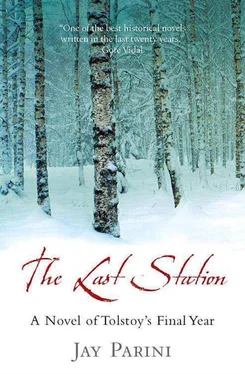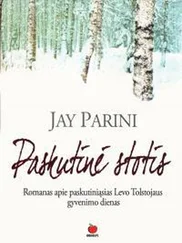He wrote back: ‘It is a great and gross mistake to speak about Tolstoyism or to seek my guidance on this matter or to ask my decisions on problems. There is no Tolstoyism or any teaching of mine, and there never has been. There is only one general and universal teaching of the truth, which for me, for us, is most clearly expressed in the Gospels.’
I understood this, yes. But I also knew that God spoke especially clearly through Leo Tolstoy. Divine light shone through his prose. And I tried to live by that light as I made my daily rounds in the village. The medical profession is well suited to a life of service, and I returned to my narrow room each night in the boardinghouse exhausted but fulfilled, happy inside. I would read his books by a blazing wick till midnight. His Confession moved me greatly, as did ‘What I Believe,’ where – with astonishing simplicity – he says what he thinks.
Who is Christ? This question has preoccupied Tolstoy for many decades. He answers, ‘He is who he says he is: the Son of God, the Son of Man, the truth and the life.’ But he is not God. That is the essential mistake made by our church theologians. What Christ gave us was a way of understanding our lives in a perspective that cannot be destroyed by death. It is the fear of death that hangs like a buzzard over mankind’s head, a perpetual torment. As Leo Nikolayevich has said, one should whisk that fear away. Say, ‘Be gone, buzzard!’ And then comes freedom.
As a token of my faith, I have forsaken women. True, I am not a handsome man. I am small. But my hands are a doctor’s hands: delicate and fine. I stitch and cut. I bandage and assuage. I am a doctor. Though I am hardly an old man, not having yet passed fifty, I am quite bald, and this seems to offend many women. My beard, which I trim each morning, seems to grow whiter by the month. But I have fire. There is a fire in my head, in my heart. I am in love with God. I can feel the fire of God in my soul. I am part of him. I am God, as everyone is God who recognizes the God within himself.
I can even recognize a bit of God in Goldenweiser, that fraud and mountebank, that pianist and Jew. Why Leo Nikolayevich allows that man to hang about this house, to play his piano, to eat at his table and walk beside him in the orchard, defeats my understanding. The superiority of the Slavic race to the Israelites has always been known. As a man of science, I cannot fail to observe the colossal sequence of defeats that the Jews have sustained. Wherever they go, they are suspect. They fester and grow in almost any soil. Leo Nikolayevich does not understand about Jews.
But every man has his blind spots. Leo Nikolayevich is not God. Nevertheless, I love him. I love him completely. I cannot believe my luck, that each day of my life since I came here six years ago, in 1904, has been spent here beside him. I have thus been privileged to listen to his words. I write them all down. I have mastered a kind of shorthand, so I rarely miss anything important.
It can be quite annoying at lunch or dinner, however. Sofya Andreyevna teases me for writing under the table whenever Leo Nikolayevich speaks. She shouts, ‘Dushan Petrovich, you’re scribbling again! Naughty, naughty!’
I have an excellent memory, however – a gift from God. Each night, before sleeping, I settle down at my little deal table and recall his words, working from notes gathered during the day. I take great care not to embellish what he says. The words of Leo Nikolayevich need no improvement! Each pause, each gesticulation and aside – all perfect. And it’s all there, in my diary. Word for word – a permanent record. My gift to humanity.
Apart from the annoyance of Sofya Andreyevna, my life here has been pleasantly routine. I spend each morning, while Leo Nikolayevich is writing, in the village. An isba has been converted into a surgery for my use, and I see a dozen or so patients there every day. Whooping cough, bad throats, intestinal obstructions, fevers, measles, consumption, venereal diseases. Cases of hysteria. Lice. I see everything. But I love our Russian peasants. They are the soul of endurance. They are simple and God loving. God fearing. This is why Leo Nikolayevich loves them, and why I do, although most of them are pathetically superstitious. They do not understand that I represent the science of medicine. What I practice is not magic. For magic, I direct them to the monastery outside Tula. Let the monks heal you, I say, if you don’t believe in my methods. Not one of them has yet taken me up on this offer.
Today was a special day. Against Sofya Andreyevna’s wishes (which made it all the more attractive), I collected Leo Nikolayevich from his study at nine-thirty. He had already been at his desk for two hours, which is unusual for him. He normally begins at nine. But he had planned on our trip into Tula this morning, so he got up and started to work before the rest of the household was awake, doubtless treasuring the early morning clarity that overtakes the soul.
We went into Tula in the troika – a relatively short and effortless journey, except in winter, when heavy drifts can block the road. Today it was unusually warm, and the roads were clear, even though it snowed lightly all night. The fields spread about us in their whiteness. It was so beautiful! Leo Nikolayevich commented several times on the freshness and stillness of the day. His health had not been good recently – some chills, some coughing – so I made sure he bundled up in several coats and wore a thick hat. I put a blanket over his legs to block the wind. He drooled slightly, and a glaze of ice soon formed in his beard, but he did not appear to notice.
Leo Nikolayevich was moved by our little excursion, which we had been planning for some weeks. Tula’s newspaper, the Molva , had been filled with nothing else. Some muzhiks from the Denisov estate had been charged with stealing mail from the postal service. They were to go on trial first, followed by something more important, something dearer to Leo Nikolayevich’s heart than mail thievery. I. I. Afanasev, whom Leo Nikolayevich met several times at Telyatinki, had been accused of circulating pamphlets advocating socialism and revolution.
‘It is always distressing when a man is accused of nothing more than expressing a view of life which is saner than that which already prevails,’ said Leo Nikolayevich, talking more to himself than to me as the troika clattered over the wooden bridge into Tula. He took on that ponderous look which sometimes overwhelms and distorts his features.
When we arrived at the courthouse, the street was thronged. Not unlike at the Kursk Station in Moscow, earlier in the month, when Leo Nikolayevich found himself drowning in a mob of well-wishers, thousands of them, all of whom screamed his name at the top of their lungs. Today, word had spread that Tolstoy would appear as a witness for the defense in both cases, and people came out hoping to catch a glimpse of him. All kinds of people, but especially beggars, who imagined that ‘the Count,’ as they persist in calling him, could work a miracle for them. Many reached out merely to touch his coat in passing.
‘Clear a path for Leo Nikolayevich!’ I shouted, and four young soldiers in dark green overcoats rushed to help us. We five formed a wedge, like geese going south, with Leo Nikolayevich in the wake of the V. He kept his head down, ignoring the shouts of ‘God bless you, Leo Nikolayevich!’ I was terrified that he would stumble or collapse, as he sometimes does, but he walked with a determined step. If anything, the attention buoyed him.
The courts were too cold for a man of Leo Nikolayevich’s eighty-two years. Though logs had been laid in all the fireplaces, the high ceilings and bare halls conspired against all possibility of comfort. And Leo Nikolayevich quickly succumbed to the frigid temperature. His lips soon began to quiver, turning blue as nails; I feared he might have another one of the minor strokes that have plagued him lately. They leave him temporarily speechless and without exact memory.
Читать дальше












